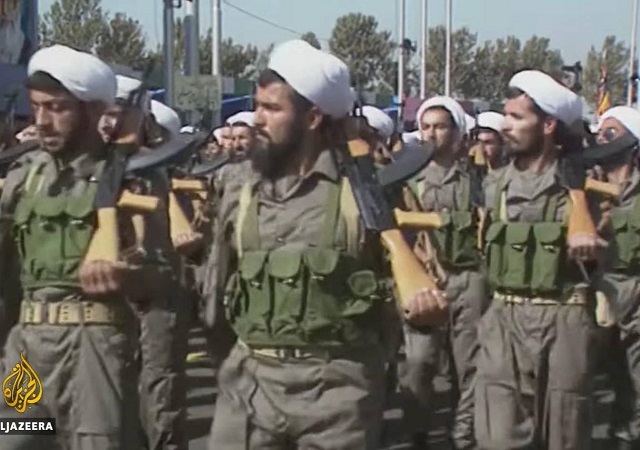International Task Force Puts Iran on Terrorism Financing Blacklist
“Blacklist would broaden U.S. effort to isolate Tehran financially and potentially further strain the Iranian economy.”

In another win for President Donald Trump’s strategy of ‘maximum pressure’ on Iran, the top global watchdog monitoring terrorism funding has placed the regime on its blacklist.
The Paris-based Financial Action Task Force (FATF) announced the sanction on Friday after Tehran refused to comply with the internationally-accepted terrorist financing conventions despite repeated warnings since 2017. Iran now joins North Korea as the second country on the blacklist.
The legal measures ensuring compliance to global terrorism founding norms were earlier rejected by Iran’s Guardian Council, the regime’s top constitutional body, claiming they were “against Islam.” Implementing these norms would have hampered Tehran’s ability to fund Lebanon’s Hezbollah and other pro-Iranian terrorist groups, media reports say.
Iran has yet to ratify the UN’s Terrorist Financing and Palermo Conventions. As a result, the FATF calls on all countries to apply effective counter-measures against Iran. See more➡️ https://t.co/W6bd3LB8yg #FATF #FATFWeek #Iran pic.twitter.com/tTQaIccL5Z
— FATF (@FATFNews) February 21, 2020
The FATF’s blacklisting means that financial transactions with Iran will be monitored even more closely. Foreign creditors will find it difficult to lend money to Iranian companies. The measure will also make it “costly and cumbersome to do business” with Iran, media reports suggest.
Since the country’s main economic sectors — namely oil, shipping, and banking — are heavily under state control, the sanctions will directly hit the coffers of the regime and its cronies in Tehran. “Blacklist would broaden U.S. effort to isolate Tehran financially and potentially further strain the Iranian economy,” The Wall Street Journal confirmed Friday.
Reuters reported FATF measures against Tehran:
The global dirty money watchdog placed Iran on its blacklist on Friday after it failed to comply with international anti-terrorism financing norms, a move that will deepen the country’s isolation from financial markets.
The decision came after more than three years of warnings from the Paris-based Financial Action Taskforce (FATF) urging the Islamic Republic to either enact terrorist financing conventions or see its reprieve from the blacklist lifted and some counter-measures imposed.
“Given Iran’s failure to enact the Palermo and Terrorist Financing Conventions in line with the FATF Standards, the FATF fully lifts the suspension of counter-measures and calls on its members and urges all jurisdictions to apply effective counter-measures,” the group’s 39 members said in a statement after a week-long plenary session.
These would entail more scrutiny of transactions with Iran, tougher external auditing of financing firms operating in the country and extra pressure on the few foreign banks and businesses still dealing with Iran.
“The consequence of (Iran’s) inaction is higher costs of borrowing and isolation from the financial system,” a Western diplomat told Reuters.
The U.S. State Department welcomed the FATF sanctions against Tehran. “The United States commends the Financial Action Task Force (FATF)’s February 21st call for all jurisdictions to swiftly enact effective countermeasures to protect the international financial system from the terrorist financing threats emanating from Iran,” the State Department said in a statement on Friday.
Earlier this month, Secretary of State Mike Pompeo had called on the FATF to finally act against the rogue regime. “Iran should be treated like any other nation. Nearly every country in the world has adopted these standards,” he said.
The decision made by the FATF comes as a vindication of President Trump’s long-held policy on Iran. The Trump administration has always argued that Tehran did not negotiate the 2015 nuclear deal in good faith and never really gave up its nuclear and territorial ambitions. President Trump pulled the U.S. out of the Obama-era deal in May 2018, paving the way for stiff economic sanctions and cutting the regime’s access to international financial markets.
Terrorism financing is part of Iran’s strategy of fulfilling it expansionist dreams. The regime funds and arms Hizbollah and other Islamic terrorist groups in the Middle East to exercise control over the ‘Shiite Crescent,’ a sphere of influence that stretches from the Afghan border to the Mediterranean Sea. Stifling the regime’s ability to finance proxy terrorist groups will cripple its hold on them.
Secretary Pompeo: ‘Iran never intended to follow nuclear deal’
[Cover image via YouTube]
 DONATE
DONATE
Donations tax deductible
to the full extent allowed by law.








Comments
Good!
Some of the biggest financial institutions and banks in this country are complicit in money funding, laundering, etc. for the enemies of the United States.
Oh, Iran has nothing to worry about. France, Germany and the U.K will come up with some method to circumvent any financial sanctions and continue to funnel money to the Iranian government.
The Iranian regime kept the resources, persistent terrorist proxies, a hundred billion dollars in financial backing, and denial of counter-claims. The the end of quid pro Bos, the end of a legacy of placing Americans et al second. Baby steps.
When are they going to put Israel on a terrorism blacklist. I know there wouldn’t be any actual reason to, but the IDF will be declared a terrorist organization for shooting at Palestinian children (launching rockets… but ignore that).
We should not engage in sanctions or other things which hurt the people of a country – extortion just makes them hate (“overthrow your leaders or we will starve you to death! but we want it to be ‘democratic'”).
Terrorism now means what “they” do because what “we” do is often similar if not identical and we call it patriotic.